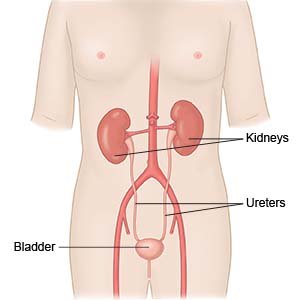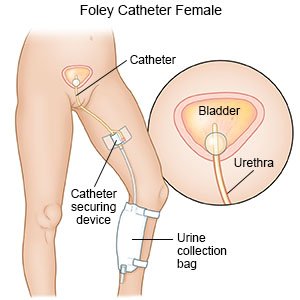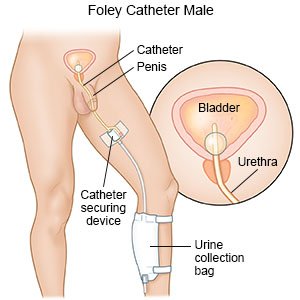Ureter Reimplantation
Medically reviewed by Drugs.com. Last updated on Aug 4, 2025.
AMBULATORY CARE:
What you need to know about ureter reimplantation:
Ureter reimplantation is surgery to fix the position of the ureters. One or both ureters may need to be fixed.
 |
How to prepare your child for surgery:
- Your child's surgeon will tell you how to prepare your child. The surgeon may tell you not to give your child anything to eat or drink after midnight on the day of the surgery.
- Tell your child's surgeon about all medicines your child currently takes. The surgeon will tell you if your child needs to stop any medicine for the surgery, and when to stop. The surgeon will tell you which medicines to give or not give your child on the day of surgery.
- Tell the surgeon about any allergies your child has, including to anesthesia or medicines.
- Your child's surgeon will tell you if your child needs any tests before surgery, and when to have them.
What will happen during surgery:
- Your child will be given general anesthesia to keep him or her asleep and free from pain during surgery. Your child may also be given a nerve block to numb him or her from the waist down. A urinary catheter will be inserted while your child is asleep. This helps drain urine from your child's bladder.


- The surgeon may do an open or laparoscopic reimplantation surgery. Open means the surgeon makes a large incision in the abdomen to see your child's bladder and ureters. Laparoscopic means the surgeon makes several small incisions in your child's abdomen. The surgeon will insert a laparoscope through the incision. This is a flexible tube with a light and camera on the end. Small surgical instruments will be inserted into the other incisions. The surgeon will complete the surgery through these small incisions.
- The surgeon will detach the ureter from the bladder. A tunnel will be made into the muscle of the bladder. The ureter will be reimplanted into the tunnel and sewn into place with stitches. The abdominal incision will be closed with stitches or skin adhesive tape and covered with a bandage.
What your child should expect after ureter reimplantation:
- Your child will be taken to a recovery room until he or she wakes up. Healthcare providers will monitor your child for any problems. Your child will then be taken to his or her hospital room. Your child will need to stay in the hospital for at least 1 night. Your child may need to stay longer depending on his or her recovery.
- The urinary catheter will stay in place until your child's ureters work properly or until the nerve block wears off. Your child may be sent home with the urinary catheter in place. Healthcare providers will teach you how to care for the catheter at home.
Risks of ureter reimplantation:
Your child may bleed more than expected or develop an infection. The ureters may not connect properly to the bladder or may leak urine. The kidneys, bladder, or other nearby organs may be damaged. Your child may need another surgery to fix organ damage.
Related medications
Seek care immediately if:
- Your child urinates less than usual or not at all.
- Your child's stitches or staples come apart.
- Blood soaks through your child's bandage.
- Your child's incision site is red, swollen, and draining pus.
- Your child has severe pain.
Call your child's doctor or surgeon if:
- Your child has a fever.
- Your child has nausea or vomits.
- Your child has pain even after taking medicine.
- You have questions or concerns about your child's condition or care.
Medicines:
Your child may need any of the following:
- Acetaminophen decreases pain and fever. It is available without a doctor's order. Ask how much to give your child and how often to give it. Follow directions. Read the labels of all other medicines your child uses to see if they also contain acetaminophen, or ask your child's doctor or pharmacist. Acetaminophen can cause liver damage if not taken correctly.
- Prescription pain medicine may be given. Ask your child's healthcare provider how to give this medicine safely. Some prescription pain medicines contain acetaminophen. Do not give your child other medicines that contain acetaminophen without talking to a healthcare provider. Too much acetaminophen may cause liver damage. Prescription pain medicine may cause constipation. Ask your child's provider how to prevent or treat constipation.
- Do not give aspirin to children younger than 18 years. Your child could develop Reye syndrome if he or she has the flu or a fever and takes aspirin. Reye syndrome can cause life-threatening brain and liver damage. Check your child's medicine labels for aspirin or salicylates.
- Give your child's medicine as directed. Contact your child's healthcare provider if you think the medicine is not working as expected. Tell the provider if your child is allergic to any medicine. Keep a current list of the medicines, vitamins, and herbs your child takes. Include the amounts, and when, how, and why they are taken. Bring the list or the medicines in their containers to follow-up visits. Carry your child's medicine list with you in case of an emergency.
Care for your child:
- Have your child rest to help with healing. Follow directions from his or her surgeon. Directions include when your child can return to school or other daily activities. Your child may need 4 to 6 weeks to fully recover.
- Care for the incision site as directed. Do not let the site get wet until the surgeon says it is okay. When it is okay to bathe your child, do not scrub the area. Just let water run over it. Gently pat-dry the area and put on new, clean bandages as directed. Change your child's bandages when they get wet or dirty. Do not put powders or lotions over your child's incision. Check the area every day for signs of infection, such as swelling, redness, or pus.
- Help your child protect the incision site. Do not let your child lift anything heavier than his or her surgeon says is okay. Have your child hold a pillow against his or her abdomen when he or she needs to cough or sneeze.
- Help your child prevent or relieve constipation. Constipation may make your child strain to have a bowel movement. The strain cause damage before your child has healed. Have your child drink extra liquids during the day. Give your child high-fiber foods. High-fiber foods include fruits and vegetables, whole-grain breads and cereals, and cooked beans.

Follow up with your child's surgeon as directed:
Follow up within 1 week if your child has a urinary catheter. Your child will need to return in 4 to 6 weeks to check if his or her ureters are working properly. Write down your questions so you remember to ask them during your visits.
© Copyright Merative 2025 Information is for End User's use only and may not be sold, redistributed or otherwise used for commercial purposes.
The above information is an educational aid only. It is not intended as medical advice for individual conditions or treatments. Talk to your doctor, nurse or pharmacist before following any medical regimen to see if it is safe and effective for you.
Further information
Always consult your healthcare provider to ensure the information displayed on this page applies to your personal circumstances.
